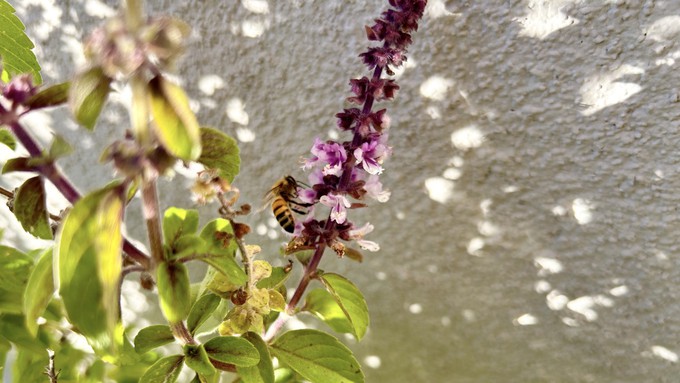
Master gardeners offer free workshop on 'Asexual Propagation'

Bees love African blue basil, but the plant must be grown from cuttings, not seeds. Learn the methods of asexual propagation during a workshop this weekend from the UC master gardeners of El Dorado County. Kathy Morrison
“Asexual Propagation”: It’s how to turn one plant into many – with no bees or seeds necessary.
Learn how during a free workshop hosted by the UC Master Gardeners of El Dorado County.
Set for 9 a.m. Saturday, Nov. 2, “Asexual Propagation” covers the many ways plants can be produced without seed, such as cuttings, root divisions, layering and more. The master gardeners will show the many examples they’ve grown at the Sherwood Demonstration Garden, site of this three-hour workshop.
“In this class, you will learn techniques to propagate some of the most common plants found within your own home, garden or landscape,” say the master gardeners. “Processes from cuttings, layering and divisions will be discussed. Save money, have fun and learn a simple way to expand your garden using materials you already have and grow.”
Sherwood Demonstration Garden is located at 6699 Campus Drive, Placerville. The workshop is free but parking is not. Advance registration is not required, by encouraged. Sign up here: https://mgeldorado.ucanr.edu/Calendar/
In addition to the workshop, the master gardeners will host their “First Saturday Garden Tour” at 9 a.m. Saturday at Sherwood Garden; no advance sign-ups necessary. (If no one shows up by 9:15, the tour is canceled.) The tour explores Sherwood’s many individual gardens that showcase different aspects of foothill gardening.
Master gardeners also will be on hand from 9 a.m. to noon to answer questions. Bring samples of mystery plants or pests in zippered plastic bags. Photos are useful, too.
More details: https://mgeldorado.ucanr.edu/
Comments
0 comments have been posted.Sacramento Digs Gardening to your inbox.
Food in My Back Yard Series
May 6: Maintain soil moisture with mulch for garden success
April 29: What's (already) wrong with my tomato plants?
April 22: Should you stock up on fertilizer? (Yes!)
April 15: Grow culinary herbs in containers
April 8: When to plant summer vegetables
April 1: Don't be fooled by these garden myths
March 25: Fertilizer tips: How to 'feed' your vegetables for healthy growth
March 18: Time to give vegetable seedlings some more space
March 11: Ways to win the fight against weeds
March 4: Potatoes from the garden
Feb. 25: Plant a fruit tree now -- for later
Feb. 18: How to squeeze more food into less space
Feb. 11: When to plant? Consider staggering your transplants
Feb. 4: Starting in seed starting
Sites We Like
Garden Checklist for week of May 11
Make the most of the lower temperatures early in the week. We’ll be back in the 80s by Thursday.
* Plant, plant, plant! It’s prime planting season in the Sacramento area. Time to set out those tomato transplants along with peppers and eggplants. Pinch off any flowers on new transplants to make them concentrate on establishing roots instead of setting premature fruit.
* Direct-seed melons, cucumbers, summer squash, corn, radishes, pumpkins and annual herbs such as basil.
* Harvest cabbage, lettuce, peas and green onions.
* In the flower garden, direct-seed sunflowers, cosmos, salvia, zinnias, marigolds, celosia and asters. (You also can transplant seedlings for many of the same flowers.)
* Plant dahlia tubers.
* Transplant petunias, marigolds and perennial flowers such as astilbe, columbine, coneflowers, coreopsis, dahlias, rudbeckia and verbena.
* Keep an eye out for slugs, snails, earwigs and aphids that want to dine on tender new growth.
* Feed summer bloomers with a balanced fertilizer.
* For continued bloom, cut off spent flowers on roses as well as other flowering plants.
* Add mulch to the garden to maintain moisture. Mulch also cuts down on weeds. But don’t let it mound around the stems or trunks of trees or shrubs. Leave about a 6-inch-to-1-foot circle to avoid crown rot or other problems.
* Remember to weed! Pull those nasties before they set seed.
* Water early in the day and keep seedlings evenly moist.